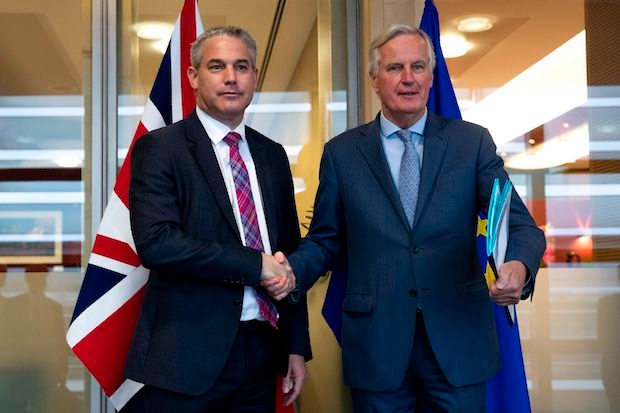The chance of a Brexit deal being agreed between the UK and EU has risen. This morning Brexit Secretary Stephen Barclay met with his EU counterpart Michel Barnier to pick up where Boris Johnson and Leo Varadkar left off at the pair’s Cheshire meet. With the Prime Minister and Taoiseach agreeing that they could see a path to a potential deal, Barclay and Barnier discussed the technical details over a two hour breakfast. That discussion appears to have gone well with the EU27 telling Barnier they are happy for talks to now intensify. A European Commission spokesperson said:
‘The EU and the UK have agreed to intensify discussions over the coming days.
The EU’s position remains the same: there must be a legally operative solution in the Withdrawal Agreement that avoids a hard border on the island of Ireland, protects the all-island economy and the Good Friday (Belfast) Agreement in all its dimensions, and safeguards the integrity of the Single Market.
The Commission will take stock with the European Parliament and Member States again on Monday in view of preparing the General Affairs Council (Article 50) on Tuesday morning.’
Where No. 10 aides were happy earlier in the week to voice their dismay that the talks were not going to plan, they have now gone rather quiet. The few signals coming from 10 Downing Street suggest that on the UK side there is cautious optimism that a deal could be possible – but there is still a long way to go.
So, what could a potential deal look like? Details of the discussion Johnson and Varadkar shared have leaked to the Irish press (and it follows that this could be a rather one-sided account). Where there could be a basis for a deal is an agreement that would see Northern Ireland effectively be in two customs territories – something not entirely dissimilar to is a reduced version of Theresa May’s New Customs Partnership. This could see Northern Ireland leave the EU customs union with the rest of the UK but the UK then enforce EU customs rules and tariffs on goods moving from Britain to Northern Ireland. Then if the EU tariff was higher than the UK’s, businesses in Northern Ireland would later receive a rebate. Such a proposition could allow Boris Johnson to say the whole of the UK had left the customs union while Leo Varadkar could say that the whole of the island of Ireland still has only one rate of customs at the border.
The problems with such a proposal is that it would most likely require an Irish sea customs border – something the DUP could see red on. One DUP MP told me this week that the believed their party had moved as much as they could in Johnson’s original offer. It is possible that a deal could be passed in the Commons without DUP votes if enough Labour MPs came forward. Government ministers have been encouraged by the number of Labour politicians to say they broadly support what Johnson has proposed. Those ministers, however, remain in the dark about what has moved in the past few days that has meant the EU are open to further discussions. There remains scepticism in government that the EU will agree to a deal that can pass the Commons. For Johnson to try and fail to pass a deal would be incredibly risky – he could find himself going into a general election with the matter unresolved and the Brexit Party accusing him of selling out.







Comments